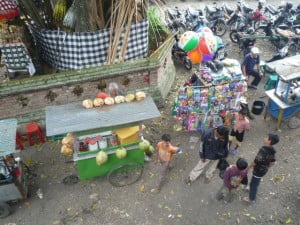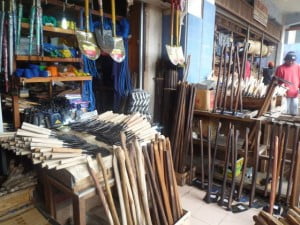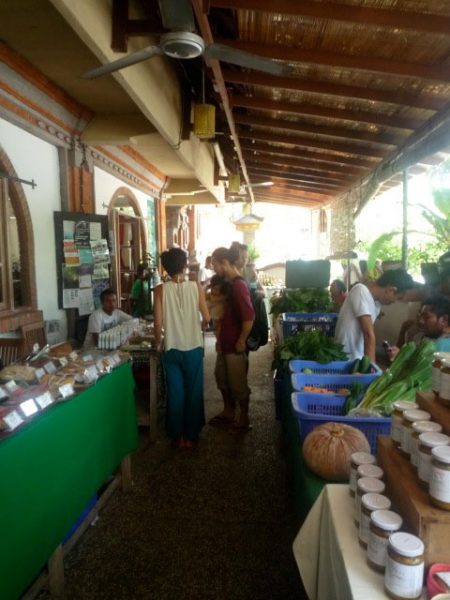Bali’s traditional markets were once a necessity in a society where refrigeration and corner stores were not as widespread as they are today.
These age-old trading centres are now giving way to the onslaught of Indomaret, Alfamart and Circle Ks proliferating all over Bali.
Bali’s farmer’s markets are one of the most enduring centres of the island’s traditional rural life. These are not the “farmers markets” found in Ubud and Sanur patronized by Western residents and tourists as venues for buying organic produce and green products, but crowded noisy native livestock markets (pasar hewan) that are found in both urban and rural settings.
Traditionally held on fixed market days of the Balinese three-day week, the pasar hewan offer the best selection and prices for domesticated animals, horticultural products, agricultural supplies and tools as well as everyday household goods. You are apt to find almost anything – from transistor radios and DVDs to posters of Indonesian dangdut queens, from shoe salesmen to purveyors of snake oil medicines. Attracted by the crowds, vendors of packaged foods, fruits and vegetables and clothing spill out on to the sidewalks and surround the market’s periphery.
For the town dweller and Balinese farmer, the main draw of these traditional markets is the pets and farm animals kept in concrete open-sided sheds. Before visiting, call the Kantor Dinas Peternakan (Office of Animal Husbandry) of the locale you live in to find out which day the market is to take place. If the market is held in the countryside, the cows, bulls and heifers are sold in bamboo pens or in the open air. To behold scenes out of medieval Bali, get there as early as you can.
The Bali Cow
Bali’s cows, hung with sweet melodic wooden or bronze bells, are amiable, beautiful creatures with long eyelashes, delicate features, dew eyes, manicured velvet coats, slender necks, trim bodies, slim legs and short tails. They look more like deer fawns than cattle. Unlike the Hindus of India, the Hindu Balinese don’t consider cattle as sacred. Bali cows are mostly bred for their meat, their bones carved into intricate horse, frog and rose pendants for sale to tourists.
The Bali cow lives a privileged life, lovingly bathed in village streams, billeted in cosy hay-strewn mangers, grazed on village lawns, seen leaping from banks with the lithe grace of an antelope. Like most cows in the tropics, they give no milk and are often used for work. When preparing for planting, the farmer first floods his rice fields, then uses a wooden sledge (tengala) pulled by one or two cows (buffaloes lack the necessary stamina) until the whole field is turned into a muddy, watery ooze.
Farmers use cows as a bank for occasions when the family is in need of immediate cash for religious rituals, medical emergencies or tuition fees and uniforms for the new school year. Although Bali has hundreds of thousands of cows on small and medium-scale farms all across the island, the quality of beef from Balinese cattle is below international standards. Thus, the majority of the island’s hotels and restaurants rely on other countries such as Australia and New Zealand for their imported beef.
Bebandem: A Country Market
 In the hills of far eastern Karangasem District, Bebandem is one of the most remote and picturesque of Bali’s farmer’s markets. To get there, travel on the road from Candidasa north towards Amlapura for 5 km, take a left in the village of Bugbug, then climb up a twisting mountain road for 13 km to Bebandem. The turnoff in Bugbug comes up quickly, the sign obscured by trees, so stay alert. On market day, which takes place every three days, this small mountain town teems with portable stands selling bakso, plastic goods, basketry and stacks of produce. Since raising pigs and chickens is one of the main sources of income for women, it is not uncommon to see a woman carrying a food stand on her head walking her pig to the Bebandem market at the end of a piece of twine.
In the hills of far eastern Karangasem District, Bebandem is one of the most remote and picturesque of Bali’s farmer’s markets. To get there, travel on the road from Candidasa north towards Amlapura for 5 km, take a left in the village of Bugbug, then climb up a twisting mountain road for 13 km to Bebandem. The turnoff in Bugbug comes up quickly, the sign obscured by trees, so stay alert. On market day, which takes place every three days, this small mountain town teems with portable stands selling bakso, plastic goods, basketry and stacks of produce. Since raising pigs and chickens is one of the main sources of income for women, it is not uncommon to see a woman carrying a food stand on her head walking her pig to the Bebandem market at the end of a piece of twine.
Beringkit: Mother of All Farmers Markets
 Only a 30-minute drive west out of downtown Denpasar, near the intersection of the Denpasar-Gilimanuk road and the road north to Mengwi’s Taman Ayun Royal Temple, Beringkit is Bali’s largest and most important farmer’s market. Taking place every Sunday and Wednesday, the market is busiest on Sundays when it’s thronged with Balinese from all walks of life. On the grounds are a fish nursery, a big bicycle shop and a food market selling dry and wet goods (sembako). Behind the parking lot is a used clothing shop and garden and flower nursery, potted plants and organic fertilizer.
Only a 30-minute drive west out of downtown Denpasar, near the intersection of the Denpasar-Gilimanuk road and the road north to Mengwi’s Taman Ayun Royal Temple, Beringkit is Bali’s largest and most important farmer’s market. Taking place every Sunday and Wednesday, the market is busiest on Sundays when it’s thronged with Balinese from all walks of life. On the grounds are a fish nursery, a big bicycle shop and a food market selling dry and wet goods (sembako). Behind the parking lot is a used clothing shop and garden and flower nursery, potted plants and organic fertilizer.
The main building consists of three floors packed with row upon row of stalls, essentially a giant flea market. On the lively 1st floor are gardening and work tools, household sundries, cheap Chinese toys, DVDs of Balinese and Javanese music, books, shoes, rindik and angklung musical instruments, with a food court in the rear. On the 2nd floor are traditional and modern clothing, leather goods, bags and shoulder bags. On the 3rd floor are sunglasses, lighters, traditional herbs, massage therapists, men’s jewelry, semi-precious stones, amulets, used clothing, and in the back a big open-air barber shop. Outside a line of food stalls serve Balinese specialties like lawar kuwir, nasi campur sate kempul and Javanese dishes like sate kambing with gule, bakso sapi and bakso ayam and coconut juice.
But the main draw is the sprawling muddy 1.5-hectare livestock market north of the parking lot (after entering the market, take a left) where farmers from all over Bali bring their mature cattle to sell and then buy calves to sell in their own farmer’s markets in Bangli, Rubaya and Seririt. Hundreds of Balinese cattle mill around in pens or stand tied up in groups in the open with jacketed and rubber booted men trading and haggling. After a deal is struck, the cows and bulls are led to a line of waiting trucks headed for Jakarta or shipped to Kalimantan.
This livestock market is also the best place to buy all types of farm animals and pets – not just dogs, rabbits, chicks, ducks and birds but many varieties of chickens (chicks, broilers, ayam kampung), and the charmingly ugly Moskovy ducks. A row of shops sells birds, bird feed, bird cages, dog food and canine accessories. A big yard is covered with the distinctive bell-shaped bamboo cages of fighting cocks. On busy Sundays you’ll see men inspecting, ruffling feathers, pulling combs, tenderly massaging, bouncing on the ground and pairing their cocks in impromptu non-lethal sparring matches. Pet, mascot, child, dream, income, for a Balinese man this proud bird takes up as much attention as a new wife.




